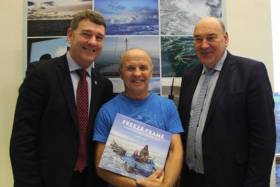Displaying items by tag: Doug Allan
International Filmmaker Doug Allan Plans Irish Tour
When the Arctic walrus nicknamed “Wally” arrived in Kerry’s Valentia and then swam over to Wales, award-winning filmmaker Doug Allan was away working on a feature film in Nepal.
However, Allan has heard of such visits before – albeit unusual – and believes his survival chances could be “pretty good”.
He spoke about this and many other topics - including whether international mountaineering expeditions should be climbing in a country with a fragile health service like Nepal during a pandemic - in the second part of his interview with Wavelengths this week.
 Doug Allan with walrus
Doug Allan with walrus
The Blue Planet, Planet Earth, Life, Human Planet, Frozen Planet, Expedition Iceberg, Forces of Nature are just some of the many documentaries which Allan has to his name.
Known as “Sir David Attenborough’s cameraman”, he has been described by the renowned broadcaster as “immune to most of the limitations that govern other humans” and “ totally without fear in a way that comes not from recklessness but from deep knowledge and experience.”
 Doug Allan filming under the ice in the Arctic
Doug Allan filming under the ice in the Arctic
Allan, who has a house in the west of Ireland, plans an Irish tour whenever it is safe to do so. He is author of Freeze Frame, published in 2012 and available in all good bookshops and here
Listen to part two of his Wavelengths interview below and part one here
Tuning in to the rhythms of the reef, singing happy birthday to belugas, how polar bears will smell you before they see you, why sharks get a bad press and how it’s more common for surfers than divers to get attacked by them.
That’s a snapshot of an interview for Wavelengths this week with internationally renowned wildlife cameraman Doug Allan.
The Blue Planet, Planet Earth, Life, Human Planet, Frozen Planet, Expedition Iceberg, Forces of Nature are just some of the many documentaries which Allan has to his name.
He has filmed whales transiting from Antarctica up to the Arctic pack ice, life on a coral reef in the Red Sea and Indonesia, and has been nose to nose with mating Right whales in Patagonia
 Doug Allan filming under the ice
Doug Allan filming under the ice
Wavelengths was lucky enough to catch him standing still – for a bit – in a quarantine hotel in London after he returned from filming in landlocked Nepal for a number of weeks. Listen to part one of a two-part interview below
Marine Institute Hosts Man Behind ‘Blue Planet’ Camera
#DougAllan - Multiple Emmy and BAFTA award-winning wildlife cameraman and photographer Doug Allan visited the Marine Institute on Wednesday (16 November) to share his remarkable insight and deep understanding of marine mammals.
Having qualified as a marine biologist, Allan now specialises in capturing spectacular footage of animals in the Arctic and Antarctic.
Spending the last 25 years bringing the most remarkable sights in the natural world into our homes, Allan has been involved in over 60 films and series such as Blue Planet, Frozen Planet and Planet Earth — the sequel to which recently began on BBC television.
To use the words of Sir David Attenborough: "Cameramen don't come more special than Doug Allan."
Allan’s awards include eight Emmys and four BAFTAs; he has twice won the underwater category in the Wildlife Photographer of the Year competition; and was awarded the Royal Geographical Society's Cherry Kearton Medal for his wildlife images. He has three Honorary Doctorates, as well as two Polar Medals.
His footage of orcas attacking grey whales, polar bears trying to capture beluga whales, and leopard seals snatching emperor penguins were the first of its kind. He has been a pioneer in both Arctic filming as well as research and has an extensive list of fascinating stories and insights.
Allan treated his audience at the Marine Institute to inspirational stories from his polar and underwater film-making career alongside some of his breath-taking images and photographs.
He told tales of how he survived encounters with polar bears, walruses and minus 40 degree temperatures to capture images of the planet's most majestic animals, above and below the ice.
Allan’s visit capped off a 17-date tour of the island of Ireland with his new show ‘In the Company of Giants’.
























































